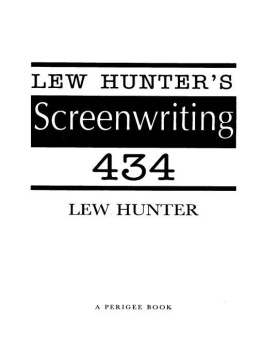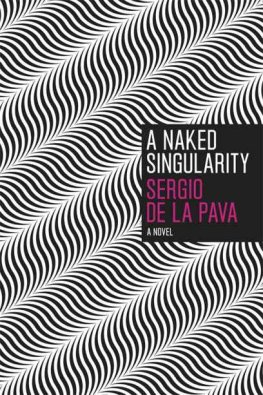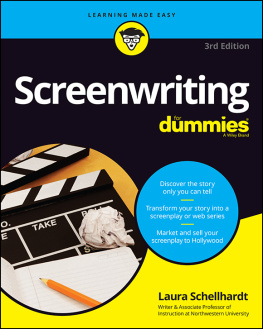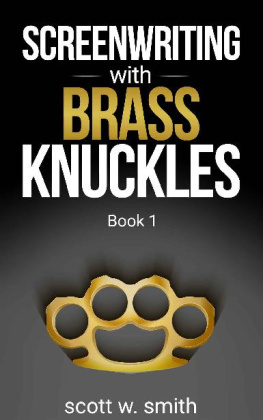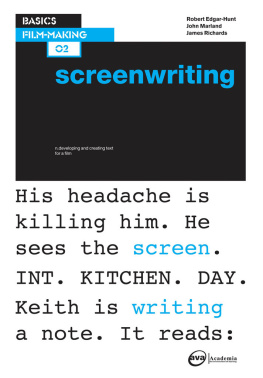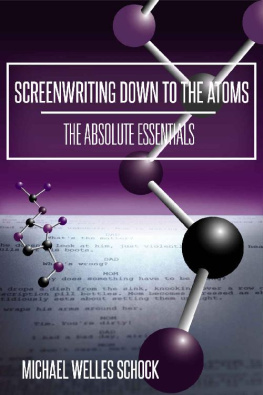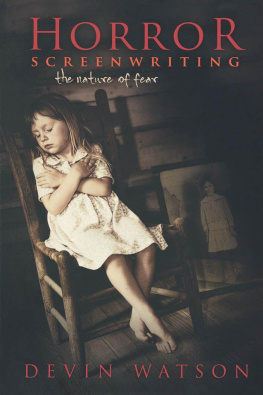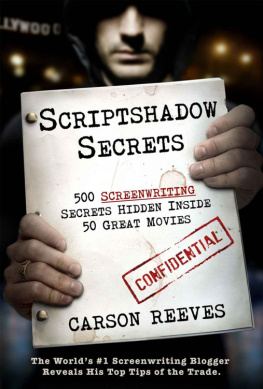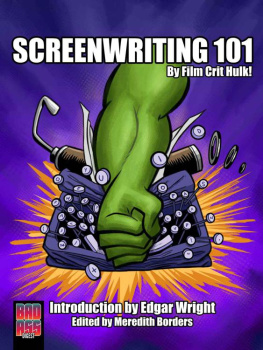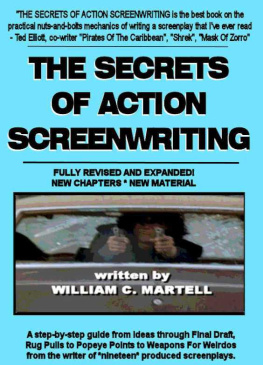Lew Hunter - Naked Screenwriting
Here you can read online Lew Hunter - Naked Screenwriting full text of the book (entire story) in english for free. Download pdf and epub, get meaning, cover and reviews about this ebook. year: 2021, publisher: Rowman & Littlefield Publishers, genre: Detective and thriller. Description of the work, (preface) as well as reviews are available. Best literature library LitArk.com created for fans of good reading and offers a wide selection of genres:
Romance novel
Science fiction
Adventure
Detective
Science
History
Home and family
Prose
Art
Politics
Computer
Non-fiction
Religion
Business
Children
Humor
Choose a favorite category and find really read worthwhile books. Enjoy immersion in the world of imagination, feel the emotions of the characters or learn something new for yourself, make an fascinating discovery.

- Book:Naked Screenwriting
- Author:
- Publisher:Rowman & Littlefield Publishers
- Genre:
- Year:2021
- Rating:3 / 5
- Favourites:Add to favourites
- Your mark:
- 60
- 1
- 2
- 3
- 4
- 5
Naked Screenwriting: summary, description and annotation
We offer to read an annotation, description, summary or preface (depends on what the author of the book "Naked Screenwriting" wrote himself). If you haven't found the necessary information about the book — write in the comments, we will try to find it.
Naked Screenwriting — read online for free the complete book (whole text) full work
Below is the text of the book, divided by pages. System saving the place of the last page read, allows you to conveniently read the book "Naked Screenwriting" online for free, without having to search again every time where you left off. Put a bookmark, and you can go to the page where you finished reading at any time.
Font size:
Interval:
Bookmark:
Lewis Ray Hunter is a Nebraska-born screenwriter, author, educator, chairman emeritus, and professor of screenwriting at the UCLA Department of Film and Television. Lewis Ray spent many years working as a film and television executive creating and producing television episodes for Disney. His personal projects include many examining the oft-ignored Japanese internment camps. Lew was also a pioneer in penning teleplays examining issues many shied away from, such as child pornography in the early 1980s.
Lewis Rays first book, bestseller Naked Screenwriting 434, has been called the final word on screenwriting by Richard Donner, director of Lethal Weapon IV, and has been read by most, if not all, aspiring screenwriters. Lewis Ray is also credited with creating the American Screenwriting Association as well as UCLAs extension writers program. Both addressed Lews desires of an all-inclusive writers network and more access for screenwriters and screenwriting students to the best the industry has to offer in education and support.
Many of the Oscar-winning scripts over the past twenty years have been written by students of Hunter. His former students and advocates include Allison Anders, Michael Colleary, James Dalessandro, Lon Diamond, William Missouri Downs, Sacha Gervasi, Pamela Gray, Laurie Hutlzer, David Koepp, Chuck Loch, Paige Macdonald, Don Mancini, Adrienne Parks, Alexander Payne, Robert Roy Poole, Dan Pyne, Robin Russin, Diane Saltzberg, Joel Schumacher, Tom Shadyac, Brad Silberling, Darren Star, Megan Steinbeck, Kathy Stumpe, David Titcher, Mike Werb, Greg Widen, Robert Wolfe, and many others. Steven Spielberg has called Mr. Hunter the best screenwriting teacher going.
Lew resides with his beautiful wife, Pamela, wherever the wind takes them but most often in Arizona. He is working on a second book of interviews with Oscar-winning screenwriters.
The worlds most beautiful (inside and out) wife, Pamela Hunter
The worlds greatest agent, Richard Curtis
Richard Ray Walter, super research associate
MBD Shelley Ray Anderson, super research associate
Rita Ray Augustine, super research associate
Kathy Ray Fischer
Editor and make-believe daughter Meg Gifford
MBD Maren Mason Chumley
Michael Hoeft
Vincent Tsu
Mike Sakamoto
Thank you to Dean Rosen, Gil Cates, Howard Suber, John Young, and Lonnie Senstock.
Thank you, LouAnne Wright, for the title because your dumb-shit (sweet) husband turned it down for his book. A tremendous merci beaucoup to the above and the giants in the index for their inspirational roles in my screenwriting, book writing, and professing career, and much gratitude to Doe Miller and Arthur Ripley, both resting in peace. Thank you to all of my favorites: Eileen, Marty, Scott, Denny, Amy, Michelle, Heather, Adam, Hilary, Hollie, Nicole, Hadley, Hannah the banana, and Christiana Pamela Marie.
I have known Francis since he was an eager kid studying directing at UCLA while I was studying in the UCLA screenwriting program. He already carried an aura of hard-working, obsessed with creativity and every UCLA film student wanted to get their scripts into his capable hands even then, as he was rumored to be the strongest writer in our program. He remains one of the strongest of writers and directors in Hollywood and its an honor to have him back in these hallowed halls to discover what hes learned along the way, and to hear his secrets to writing, directing and just living a creative life.
L EW : Happy to have you here, Francis. We have photographers who are going to take a couple of pictures and leave if thats okay with you. My next book is going to be called Naked Screenwriting: Academy AwardWinning Authors Bare Their Art, Soul, Craft, and Secrets. Oliver was here; Billy Wilder was here; Ron Bass, Julius Epstein, Frank Pierson, Ernie Lehman, Tom Schulman, Bruce Joel Rubin, Irving Ravetch were all here.
F RANCIS : You all got to listen to these?
L EW : Its over a period of multiple 434s. This is my current graduate class. The rest are distinguished visitors and Shelley Anderson, who has been coordinating this affair. Professor Caruso and Hal Ackerman from our screenwriting department. Terry Bond Michael, in charge of UCLA public information; Marina Goldovskaya, our distinguished documentary professor, who comes to us from beautiful uptown Moscow; and Maren and Vincent, our research associates. But the people around the table, Francis, will be professional screenwriters. Our average age is thirty. As you can see, theyre fairly grown up. Old is another way to put it.
F RANCIS : They look young to me.
L EW : Well, me, too, but Im pretending. These particular people audition to get into this school and were selected from about five hundred applications, although the pool is growing each year. They also audition to get into our classes. We put these great eight together, and this class is the best Ive ever had here, so thats why I say every one of them will be a professional screenwriter.
Ah! Come on in, Robert. Are you going to stay with us or are you going to be diplomatic and say hello and then leave? Youre going to stay? Good, good, good. Were trying to inculcate him with the concept of writing being important to film school, and hes learning. Most of you know our dean, Robert Rosen. Okay? Lets see. Lets go back to 1960. I was going out of graduate school as you were coming in.
F RANCIS : Yes, it was 1960.
L EW : I remember you as a little, skinny Italian kid who had all the keys. He would be shooting at three oclock or four oclock in the morning, and then when he wasnt shooting at three oclock or four oclock in the morning, hed be cutting. We both shared the wonderful director and professor Dorothy Arzner as one of the true pinnacles of our young experience and actually our entire lifetime.
F RANCIS : She was totally wonderful.
L EW : We want to talk here about process. I want to first ask you the same question I asked Billy Wilder: Do you consider yourself a director or a screenwriter?
F RANCIS : I consider myself a writer. Thats the point of view I started from, and thats always at the root of my aspiration.
L EW : How do you feel about screenwriting being mostly in the oral tradition of storytelling? Does that track, or do you have another view?
F RANCIS : Well, as a kid, I started writing plays. Dumb little plays for the high school and college musicals. My family were a musical comedy. My dad actually conducted. I saw shows sitting in his orchestra pits. I was interested first in plays, specifically musicals, because of this. I had a brother who was a philosophy major, reading Andre Gide, James Joyce, and all. He was an older brother I looked up to. From him, I got a sense of the literary. He gave me books like Brave New World. To top it off, I was a kind of kid scientist. That was my own natural thing when I wasnt imitating my brother or my father. That ultimately got me into theater because in theater they needed someone to do the lights, which is why I had all the keys. I was always the one who controlled the technology.
I only became a director because I never was very high on my writing. Writers can be very tough on themselves. I was as a kid, certainly. I was just heartbroken because I felt I had no writing talent. I remember that drove me more into directing. I would be hanging lights, and Id see the professor who was directing the play give directions. I thought, Well, gee, I could do that. So I became more of a director because of my great tragedy, of my failure as a writer when I was nineteen or twenty. I can remember weeping over it, really, literally, because talent was a very important thing in our family. That was more important than anything, whether or not you had it, an issue none of us will ever satisfy in our lifetimes.
Font size:
Interval:
Bookmark:
Similar books «Naked Screenwriting»
Look at similar books to Naked Screenwriting. We have selected literature similar in name and meaning in the hope of providing readers with more options to find new, interesting, not yet read works.
Discussion, reviews of the book Naked Screenwriting and just readers' own opinions. Leave your comments, write what you think about the work, its meaning or the main characters. Specify what exactly you liked and what you didn't like, and why you think so.

